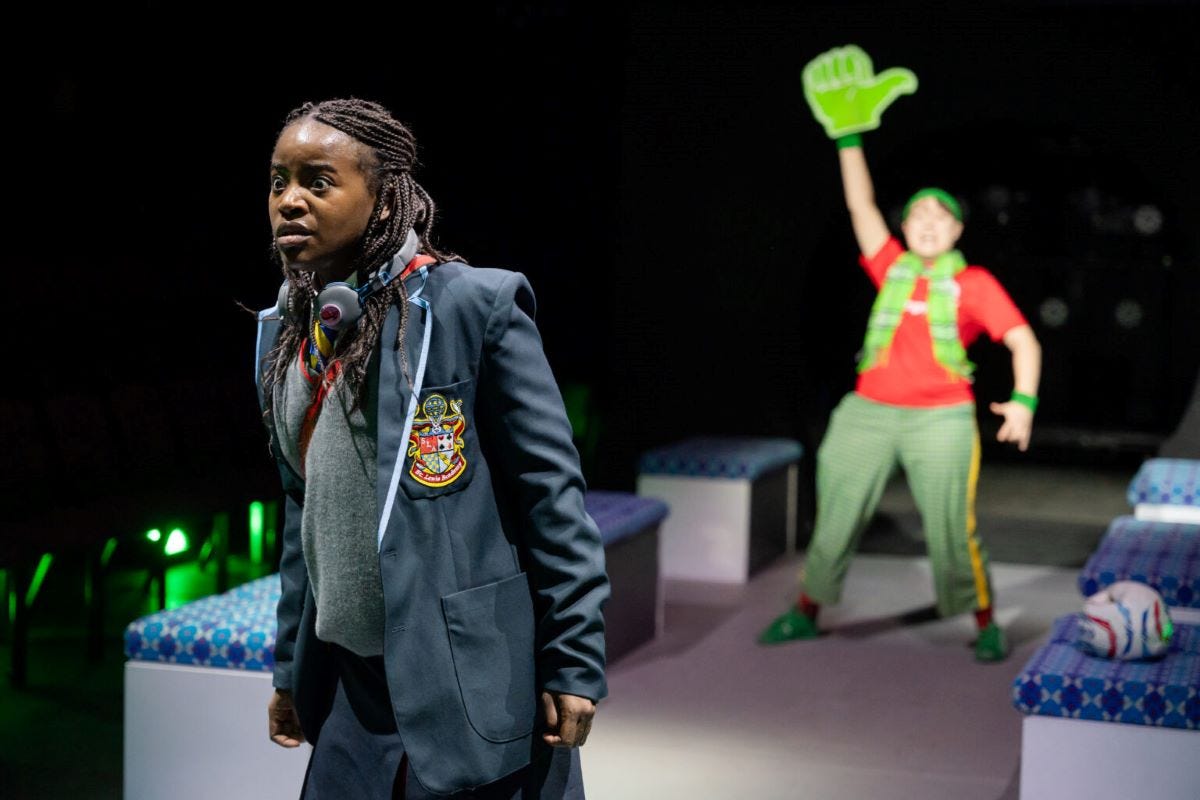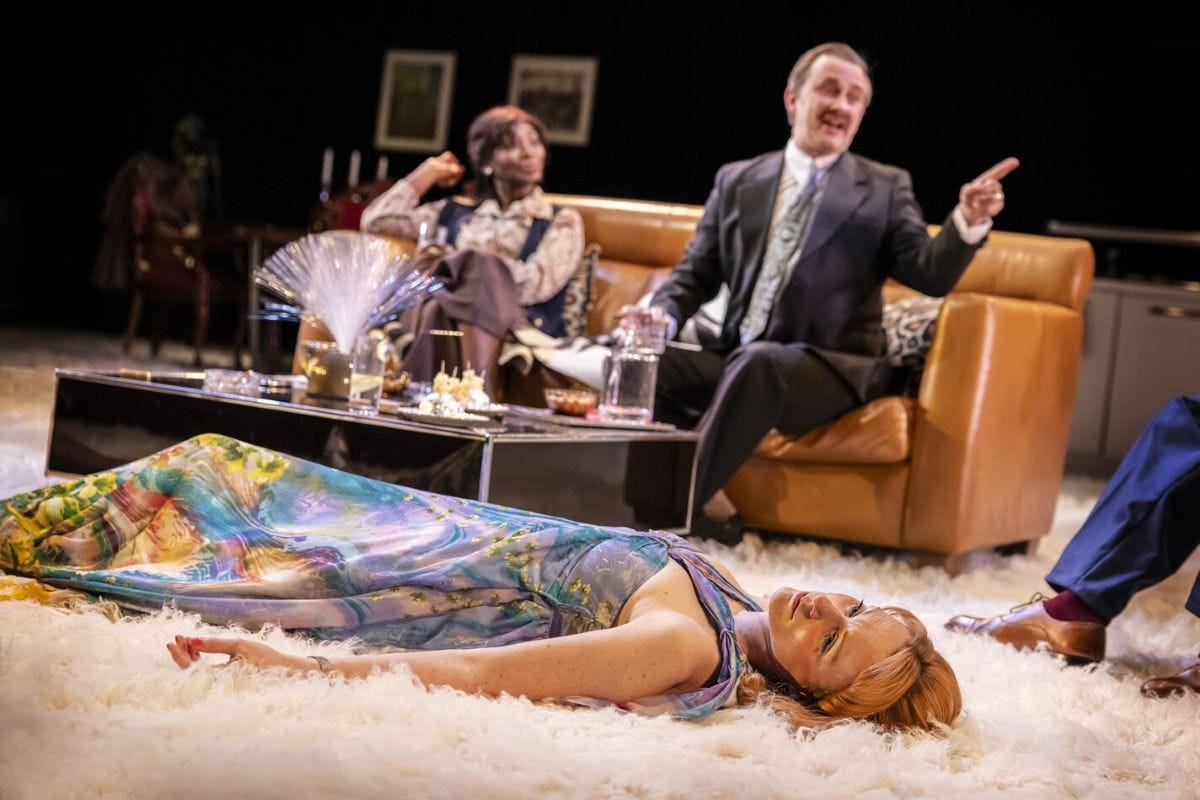"Devising takes time, trust and money to get right."
Playwright, director and co-founder of company Poltergeist Theatre Jack Bradfield on Alice In Wonderland at Brixton House and The Habits at Hampstead Theatre. Plus: three shows to see next week.
Hello, and welcome to The Crush Bar, a newsletter about theatre written by Fergus Morgan.
This is the free, Friday issue, which usually contains a Q&A with an exciting theatremaker or an essay on a theatre-related topic. This week, there is an interview with Jack Bradfield, playwright, director, and co-founder of company Poltergeist Theatre. After that, there are your three show recommendations for next week: two in London and one in Scotland.
In case you missed it, here is this week’s issue of Shouts And Murmurs, which is a weekly round-up of the most interesting reviews, interviews and articles on theatre elsewhere…
You can get Shouts And Murmurs straight in your inbox every week by signing up as a paid supporter of The Crush Bar for £5/month or £50/year. If you don’t feel like paying but still want to get the newsletter, then just reply to this email saying so, and I will make that happen.
There are a couple more things you can do to support this newsletter: you can share it with anyone you think might enjoy it and encourage them to subscribe, and you can use it for promotional purposes. There is more info about that here. Right, on with the issue.
Writer and director Jack Bradfield makes unconventional, unexpected theatre.
Poltergeist Theatre, the devising company Bradfield co-founded with Will Spence, Alice Boyd and Rosa Garland while studying at Oxford University, has created a series of striking shows: 2018’s Lights Over Tesco Car Park, an experimental documentary about UFO sightings; 2019’s Art Heist, a comedy caper about a bungled burglary; 2021’s Ghost Walk, an app-based audio tour about supernatural spirits that was released during lockdown, and 2022’s Alice In Wonderland, a freewheeling adaptation of Lewis Carroll’s novel set on the Underground, that was heaped with praise when it first ran at Brixton House two years ago, and is now back at the South London venue.
Outside Poltergeist Theatre, Bradfield is carving out a career as a director - he was resident director at the Almeida Theatre, has assisted on several Rob Icke shows including Hamlet in New York, and staged Abigail’s Party with English Touring Theatre this year after winning the RTST Sir Peter Hall Directing Award - and as a playwright, with his debut The Habits arriving at the Hampstead Theatre in February.
Tell me about Alice In Wonderland. Where did it come from?
We originally pitched three ideas to Brixton House for a Christmas show. One was The Pied Piper, told through two town hall meetings, one held by humans and one by mice. One was a version of Red Riding Hood. The one that stuck, and the one we ended up making, was a version of Alice In Wonderland set on the Underground. The magic of being a child exploring London felt like an amazing starting point.
What happens in your version of the story?
In our version, Alice has a fight with her mum on the platform at Brixton, then jumps on a train that she can’t get off. She is trapped just like in the book. The book is very episodic. Alice meets a new person, has a weird experience, and moves on. That happens in our version, too. Alice hops from carriage to carriage, meeting new people along the way. Ultimately, she has to confront the driver.
What were you inspired by, beyond the original book?
Lots of things. Studio Ghibli. Pixar. Into The Spider-Verse. Snowpiercer. Train To Busan. From the beginning, we wanted a strong visual world. The creative team – our set designer, our illustrator, our lighting designer, our costume designer, our lyricist – was involved in building that world together from early on.
The show was a hit when you first staged it two years ago. Now it is back.
It has been lovely bringing it back, actually. I’ve never revived a show before. We’ve added an extra song. We’ve tightened up some of the scenes. It has been great.
How did you first get interested in theatre?
I was born in Norwich and moved to Bromley when I was young. I grew up with my mum. My grandmother started taking me to the theatre when I was about 12 or 13. I got really interested in it and started seeing everything I could at the National Theatre via their Entry Pass scheme. That was my big theatre education, seeing shows at the NT for £5. I really remember Nick Hytner’s production of Othello with Adrian Lester and Rory Kinnear. That was a really huge moment for me.
How did you start making theatre yourself?
I did a little bit of acting at school but I had this feeling it wasn’t for for me. I genuinely think it is because I was terrified of forgetting my lines. I had this amazing drama teacher who let me direct something, though. I did The Importance Of Being Earnest with some school friends. That is sort of what I’ve ended up doing in my career: not waiting for permission and just putting a show on somehow.
You met the rest of Poltergeist Theatre at Oxford University, right?
I was studying English Literature but I did a lot of theatre. I met Will Spence, Rosa Garland and Alice Boyd, and we started putting on shows. We made the first version of Lights Over Tesco Car Park as students, then took it to the National Student Drama Festival, then Incoming Festival at the New Diorama Theatre, then to the Edinburgh Fringe in 2018, which is when you saw it for The Stage, I think.
I did. It was an experimental documentary about aliens. There was a bit where the audience switched on their phone lights like a Coldplay gig, and a bit where you all sat there until an audience member got up and did something. What inspired you?
Will had a really vivid memory of seeing a UFO as a child. We talked about that a lot. That was when the internet was beginning to become a place where truth was a bit messy and blurring and odd, too. The phrase post-truth was going around. We were interested in interrogating that, and aliens seemed like a good way of doing so. We were also keen on the genre. We thought: ‘We haven’t seen any shows about aliens? Why not?’ That genre element to our work is something we really love.
I can see that in your second show Art Heist, too, which you made after winning the New Diorama Theatre’s Untapped Award in 2019. How did you learn to devise work?
We just did it. I had seen Anthony Neilson’s play Unreachable at the Royal Court, which he had gone into without a script. I loved it and wondered how you could do that. To be honest, we just got together and followed our gut impulses. None of us have studied devising theatre. We just developed a process by working together.
What does that process look like?
The thing about devising is that it takes time, trust and money to get it right. Our shows always come out of a series of workshops. For Alice In Wonderland, we spent three days coming up with pitches for the show together. One of them stuck. Then we did a week together, throwing in more ideas. Then we did a week with actors and other collaborators. I put a script together out of that. A few months later, we came together again and worked on that script. It is this really iterative process, which ultimately ends up at a normal four-week rehearsal process with a script.
How does Poltergeist Theatre work?
We have an incredible producer, Emily Davis, who is brilliant at getting the right companies and collaborators on board, and at applying for funding. We rely on funding a lot. That does mean that our shows take a long time to make. We are currently working on an idea that we have already been thinking about for two years, and that probably won’t happen for another two. We don’t rush things. We find the right project and then put in the work. It requires a lot of trust from theatres, though. As a devising company, you go into a meeting without a script, just an idea. The theatre has to trust you to develop that into something exciting.
You do stuff outside Poltergeist Theatre, too, including a lot of assisting work.
I was resident director at the Almeida Theatre, then assisted Rob Icke at Internationaal Theater Amsterdam, then on Hamlet and Oresteia in New York, then Player Kings in the West End. I also worked with Richard Jones on Pygmalion at the Old Vic. Those were all thrilling rooms to be in. The main thing I learned is that artistic rigor and kindness are not exclusive. The best work comes if you do both.
You won the RTST Sir Peter Hall Directing Award last year and got the chance to direct Abigail’s Part with English Touring Theatre as a result. Why that play?
Every time we do classic comedies, we tend to repeat them in exactly the same way. Mike Leigh’s Abigail’s Party is always done in a way that feels like the 1977 film. Why are you allowed to experiment with Tennessee Williams or Arthur Miller, but you can’t do that with British comedies? That was my starting thesis. The more I looked into the play, the more I discovered all this horrific, strange, dark stuff underneath the surface. Richard Eyre once called it Britain’s first social horror.
We did it on a giant deep shag carpet. We had a mini cooper on stage. As the play went on, it became degraded and strange and weird. I think it worked. I hope it did.
You write plays, too. Who are you inspired by as a playwright?
I’m a huge fan of Branden Jacobs-Jenkins. Seeing An Octaroon at the Orange Tree was a huge moment for me. I loved Appropriate, too. And I am a huge fan of Annie Baker, too. I thought The Flick was brilliant. They are two of my big heroes.
Your debut play, The Habits, opens at Hampstead Theatre in February. It is about a group of friends who meet at a boardgame café to play a game every week, right?
I am a big Dungeons and Dragons fan. It is something I got into during lockdown. You sit around a table with friends. There are all these rules but you are basically telling a story together, with everyone playing different characters. Games can go on forever. I met some people that have played one game for three years.
It is having a big resurgence at the moment. I thought there was something so interesting in why people are getting involved in these fantasy spaces where you can have a lot of control, right at the moment the real world is going downhill. There is also a lot of Dungeons and Dragons content online. People like to watch other people playing the game. I thought there was theatrical potential there.
Alice In Wonderland runs at Brixton House until January 4. The Habits runs at Hampstead Theatre from February 28 until April 5.
Three shows to see next week
Cyrano - Park Theatre, until January 11
Australian writer and actor Virginia Gay’s freewheeling, gender-swapped, meta-theatrical adaptation of Edmond Rostand’s famous play about the long-nosed love from France was first seen in Melbourne in 2022, then made its European premiere at the Traverse Theatre during this year’s Edinburgh Fringe. Dazzlingly clever, sharply satirical, and deeply moving all at once, it was my favourite show of the festival. Now, it transfers to Finsbury Park’s Park Theatre over Christmas. You can read my five-star review in The FT here and get tickets via the button below. I would also highly recommend Gay’s gloriously annoying turn in the latest series of Colin From Accounts.
Hold Onto Your Butts - Arcola Theatre, until January 11
There is something about stupid stage parodies of Jurassic Park that I cannot resist. Superbolt Theatre produced a brilliant one several years ago called Dinosaur Park. This three-handed American import from company Recent Cutbacks is equally good. It is, essentially, a shot-for-shot remake of the movie and its classic moments, imaginatively realised with unexpected props and physical comedy. It was also a hit in Edinburgh in August and you can now get tickets for its London transfer below.
A Christmas Carol - various, until January 4
Wonder Fools is the Scottish theatre company led by Robbie Gordon and Jack Nurse - who featured in The Crush Bar last December - that produced the hit productions 549: Scots Of The Spanish Civil War, Oran, and The Events. This Christmas, they are working with Musselburgh’s Brunton Theatre - sadly set to be demolished - to stage a panto version Charles Dickens’ festive favourite at Haddington’s Corn Exchange and Musselburgh’s Loretto Theatre. You can get tickets via the button below.
Episode six of my podcast A History Of Scottish Drama In Six Plays was released on Monday. It is all about the 2000s, the birth of the National Theatre of Scotland, and the astonishing, globe-trotting play that it produced within months of its existence, Gregory Burke’s Black Watch. You can listen to it wherever you get your podcasts.
That’s all for this issue
That is it for this week. If you want to get in touch about anything raised in this issue - or anything at all, really - just reply to this newsletter or email me at fergusmorgan@hotmail.co.uk. Or you can find me on Bluesky, where I am @FergusMorgan.
A quick reminder of the ways you can support The Crush Bar. You can share it. You can use it for promotional purposes. And you can become a paid supporter, which means you get an extra weekly email, Shouts and Murmurs, every Tuesday. There are currently 3555 subscribers, 112 of whom are paid supporters. If you would like to join them, you can do so above.
Fergus









